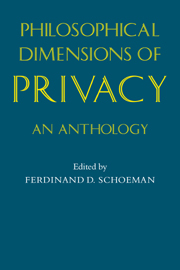Book contents
- Frontmatter
- Contents
- List of contributors
- Preface
- 1 Privacy: philosophical dimensions of the literature
- 2 Social distance and the veil
- 3 The origins of modern claims to privacy
- 4 The right to privacy [the implicit made explicit]
- 5 Privacy [a legal analysis]
- 6 Privacy as an aspect of human dignity: an answer to Dean Prosser
- 7 Privacy [a moral analysis]
- 8 Privacy, freedom, and respect for persons
- 9 Privacy and self-incrimination
- 10 Intimacy and privacy
- 11 The right to privacy
- 12 Why privacy is important
- 13 Privacy, intimacy, and personhood
- 14 Privacy: some arguments and assumptions
- 15 An economic theory of privacy
- 16 Privacy and the limits of law
- 17 Privacy and intimate information
- Selected bibliography
- Index of names
10 - Intimacy and privacy
Published online by Cambridge University Press: 12 December 2009
- Frontmatter
- Contents
- List of contributors
- Preface
- 1 Privacy: philosophical dimensions of the literature
- 2 Social distance and the veil
- 3 The origins of modern claims to privacy
- 4 The right to privacy [the implicit made explicit]
- 5 Privacy [a legal analysis]
- 6 Privacy as an aspect of human dignity: an answer to Dean Prosser
- 7 Privacy [a moral analysis]
- 8 Privacy, freedom, and respect for persons
- 9 Privacy and self-incrimination
- 10 Intimacy and privacy
- 11 The right to privacy
- 12 Why privacy is important
- 13 Privacy, intimacy, and personhood
- 14 Privacy: some arguments and assumptions
- 15 An economic theory of privacy
- 16 Privacy and the limits of law
- 17 Privacy and intimate information
- Selected bibliography
- Index of names
Summary
Intimacy and privacy seem to go together. The vast majority of us seek isolation from outsiders for our experiences of intimacy and regard it as indecent for others to intrude upon them.
Why should this be so? A number of reasons suggest themselves. For one thing, people may simply not want to be distracted, any more than they do when they are involved in anything that is important and engrossing. For another, there may be things about the way they act in their intimate relationships which they want to hide because these would discredit them in the eyes of others. Then there is the fact that intimate relationships have as an important part of their content the exclusive sharing among the intimates of things about themselves that no one else knows. The nature of the intimate relationship itself would naturally make up an important part of this exclusive stock of information. To allow outsiders to come in and find out about every detail of intimacy would therefore be seriously to impoverish the “moral capital” upon which the relationship can draw for its sustenance.
I shall argue that the relationship between privacy and intimacy runs deeper than this. Specifically, I shall argue that a fuller analysis will show that intimate relationships simply could not exist if we did not continue to insist on privacy for them.
An experience of intimacy is first of all an experience of a relationship in which we are deeply engrossed.
- Type
- Chapter
- Information
- Philosophical Dimensions of PrivacyAn Anthology, pp. 265 - 271Publisher: Cambridge University PressPrint publication year: 1984
- 14
- Cited by



